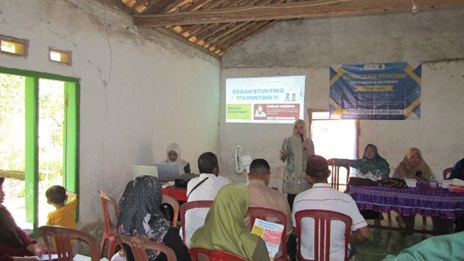Pentingnya Gizi Seimbang untuk Mencegah Dampak Buruk Stunting pada Kesehatan dan Perkembangan Anak Sejak Dini
The Importance of Balanced Nutrition to Prevent the Bad Impact of Stunting on Children's Health and Development from an Early Age
DOI:
https://doi.org/10.33084/pengabdianmu.v9i11.7954Keywords:
Prevent Stunting, Nutrional Counseling, Puzzle On My PlateAbstract
According to result of 2022 Indonesian Nutritional Status Survey, stunting rates in Indonesia is quite high especially at 21.6 %. Eventhough it decreased by 24.4 % in 2021 compared to previous year, this is relatively high score. Stunting is the condition where babies are taller or shorter than their age. It is measured by the the height that exceeded minus two standard deviations from average growth standard of WHO for children. Stunting in the infants is the chronic nutritional problems caused by several factors including socio-economic condition, infant pain and poor nutritional intake and maternal diet during pregnancy. In future, stunted babies will have some difficulties in achieving optimal cognitive and physical development. Stunting had impacts on children's health. Stunting can expand a risk of infection and disease, reduce mental performance, reduce economic productivity and fertility, and increase a risk of chronic diseases. An impact of stunting can be felt in the long and short term.
Downloads
References
Adair, Linda S., Caroline H. D. Fall, Clive Osmond, Aryeh D. Stein, Reynaldo Martorell, Manuel Ramirez-Zea, Harshpal Singh Sachdev, Darren L. Dahly, Isabelita Bas, Shane A. Norris, Lisa Micklesfield, Pedro Hallal, and Cesar G. Victora. 2013. “Associations of Linear Growth and Relative Weight Gain during Early Life with Adult Health and Human Capital in Countries of Low and Middle Income: Findings from Five Birth Cohort Studies.” The Lancet 382(9891):525–34. https://doi.org/10.1016/s0140-6736(13)60103-8
Kemenkes RI. BUKU SAKU Hasil Survei Status Gizi Indonesia (SSGI) 2023.; 2023.
Komala, Ramadhana, Wiwi Febriani, Erfha Nurrahmawati, and Karin Ariska. 2023. Peningkatan Pengetahuan Gizi Ibu Tentang Konsumsi Protein Hewani Untuk Cegah Stunting Melalui Penyuluhan Dan Permainan Puzzle Isi Piringku. JPM Ruwa Jurai 8(1):35–40. https://doi.org/10.23960/jpm8135-40
Puspasari, Heny. 2021. “Faktor-Faktor Yang Berhubungan Dengan Kejadian Stunting Pada Anak Usia 1 – 24 Bulan.” Syntax Literate ; Jurnal Ilmiah Indonesia 6(10):5061. https://doi.org/10.5455/nutricia.v6i5.5276
Ria Muji Rahayu, CSP Wekadigunawan & Eti Poncorini Pamungkasari. 2018. Biopsychosocial Determinants of Stunting & Wasting in the Children Aged 12-48 Months. Journal of Maternal & Child Health 03(02):105–18. http://dx.doi.org/10.26911/thejmch.2018.03.02.03
Rahmanindar, Riska Arsita Harnawati & Nora. 2020. Pengaruh Penyuluhan Program Isi Piringku Dalam Meningkatkan Sikap & Perilaku Ibu Untuk Manangani Balita Gizi Buruk. Jurnal Medikes. (7).2: 259–70. http://dx.doi.org/10.36743/medikes.v7i2.235
Rusliani, Novie, Hariyani Sulistyoningsih & Wuri Ratna Hidayani. 2022. Literature Review: Faktor yang Berkaitan Dengan Kejadian Stunting Pada Balita. Buletin Ilmu Kebidanan & Keperawatan (1)01: 32–40. https://doi.org/10.56741/bikk.v1i01.39
Yanti, Feni Betriana, Nova Dwi & Imelda Rahmayunia Kartika. 2020. Faktor-Faktor Penyebab Stunting: Tinjauan Literatur. REAL in Nursing Journal (3) 1:1. http://dx.doi.org/10.32883/rnj.v3i1.447

Downloads
Published
How to Cite
Issue
Section
License
Copyright (c) 2024 Karin Ariska, Rivana Maharani, Lisa Nuraini

This work is licensed under a Creative Commons Attribution-ShareAlike 4.0 International License.
Authors who publish with this journal agree to the following terms:
- Any article on the copyright is retained by the author(s).
- Author grant the journal, right of first publication with the work simultaneously licensed under a Creative Commons Attribution License that allows others to share work with acknowledgment of the work authors and initial publications in this journal.
- Authors are able to enter into a separate, additional contractual arrangements for non-exclusive distribution of published articles of work (eg, post-institutional repository) or publish it in a book, with acknowledgment of its initial publication in this journal.
- Authors are permitted and encouraged to post their work online (e.g., in institutional repositories or on their websites) prior to and during the submission process, as can lead to productive exchanges, as well as earlier and greater citation of published work.
- The article and any associated published material is distributed under the Creative Commons Attribution-ShareAlike 4.0 International License










